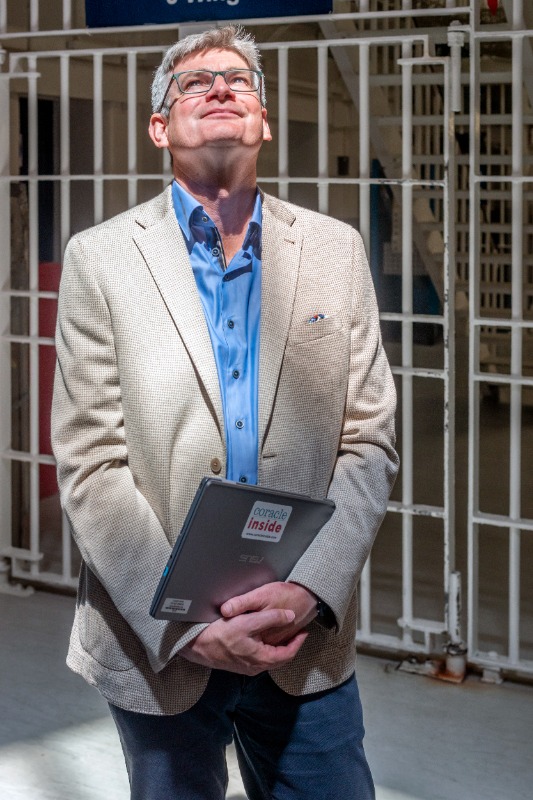search
date/time
 | Yorkshire Times A Voice of the Free Press |

Ruby Watson
Feature Writer
1:01 AM 19th August 2023
business
From Prison To Palace With James Tweed

James Tweed
His Cambridge-based company provides laptops to prisoners across England and Wales and has plans to expand globally.
James explains that the laptops that Coracle supply prisons with “are designed specifically to work offline so there’s no internet access and no networking on the laptops” but they are “pre-loaded for individual prisoners with educational content”.
This content is supplied from “20 or 25 different content partners ranging from the Open University to adult reading schemes and within that there’s lots of employability courses and courses on other life skills”.
Coracle has managed to get an astonishing 2,500 laptops to prisoners across 86 different prisons in England and Wales.
James also explained that the laptops are “authorised for unsupervised use” so a prisoner “can have it in their cell to work on in their own time”. James also said that Coracle “work quite closely with Google” to ensure the security settings on these laptops are robust.
...0.1% of children in the country get permanently excluded, but 42% of prisoners have been excluded...
James also spoke about life in prison, stating that: “lots of people are still spending 23 hours a day locked up in a cell because there is a staffing crisis in the sector”. He also commented on the link between education and prison, “people who end up in prison often will have had a bad experience of school. I think that something like 0.1% of children in the country get permanently excluded, but 42% of prisoners have been excluded from school”.

James Tweed with His Majesty The King
“It’s fundamentally depressing. We’ve gone so digital but we’re not telling people who come out of prison how to navigate that. So having access to education is important. But doing it digitally is also really important”.
...lots of people are still spending 23 hours a day locked up in a cell because there is a staffing crisis in the sector...
James explained that providing prisoners with a laptop was not about trying to give them an unfair advantage, but just trying to educate prisoners on how to use technology that they aren’t familiar with, so that when they come out of prison they can confidently use the everyday technology that we take for granted.“Prisons are not nice places. They are relentlessly noisy and scary, and your food budget is £2 a day for three meals. These are really tough places to be and access to a laptop is not about giving prisoners an unfair advantage, it’s trying to make sure that their life can be changed so they can contribute to society.”
“Can you imagine coming out of prison with no phone and you don’t even know how to buy a train ticket? And knowing a lot of these prisoners, I know how they’ll react. They’ll just be so frustrated that they’ve been set up to fail”.
James also reflected upon the first time he gave a prisoner a laptop in a maximum-security prison, “I saw in front of me, probably the scariest human being I’ve ever met completely change because I’d said, “Look, I trust you not to break this”.
“He got very emotional saying “no one ever trusts me”. I realised what we were doing was providing hope to somebody and the ability to legitimately take control of something in their life. It was just a really powerful thing that resonated with me so much”.
Can you imagine coming out of prison with no phone and you don’t even know how to buy a train ticket?
Last month, James visited Buckingham Palace to receive a King's Award for Promoting Opportunity and told his Majesty about his extraordinary entrepreneurial journey.
“Something like the King’s award is so powerful to our staff, particularly the ones going into prisons because they can see that we’re doing something that is making a difference”.
“A lot of our staff are ex-prison staff who’ve left because they felt they were just there to lock and unlock doors, but they weren’t really helping the prisoners. They’d become time pressured to do menial tasks that they weren’t really making a difference”.
James explained why receiving the King’s Award is so important for a company like Coracle, “We’ve got 87,000 people in prison they will come out one day. There are fundamental problems with the way the system is being run, I think. We're trying to tackle those problems and an award like that makes a difference for us to be able to get it up the agenda”.
“If we don’t do something positive with people in the time that they’re in prison we cannot be upset that they are going to repeat their behaviours.”
... 87,000 people in prison they will come out one day
“We put more people in prison in this country than anywhere else in Western Europe. We put them in for longer and yet we still have very high reoffending rates. So, I feel that's a problem that needs tackling and can be sorted out”.Also by Ruby Watson...
Big Bike Reveal Launches In West YorkshireHow Performing Arts Franchises Champion Wellbeing And Empower CommunitiesGateshead College Alumni Star In New BBC Comedy Pilot ShowDon’t End Up In Financial Hot Water Insurance Expert WarnsWe Shouldn’t Have To Fight For The Help That Our Children Need And Deserve